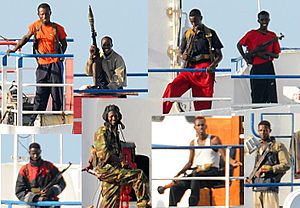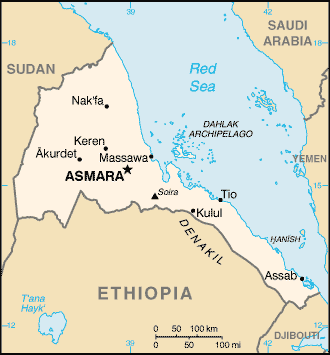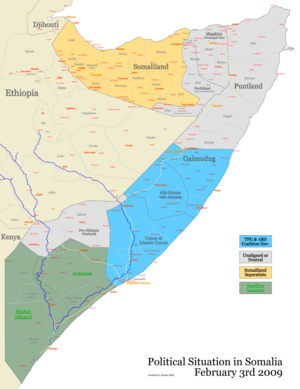

Just doesn't roll off the tongue the same way...
Strategic-thinking type folks began talking about the concurrent conflicts in Afghanistan and Pakistan as the "Af-Pak" problem last year because of their interconnected nature, the porous borders and the broad Pashtun belt that ignores them, and the ability of insurgent groups to freely cross those borders.
It looks like, given two recent news items, that it may be useful to start thinking about the conflicts in Yemen and Somalia in a similar manner.
Item 1:
Senior leaders of the Shabab rebels promised Friday to send their fighters beyond Somalia to Yemen and wherever jihad beckoned.
In a military ceremony here, where the rebels publicly showed off hundreds of new recruits, Sheik Muktar Robow, a senior rebel official, said the group would “send fighters to Yemen to assist our brothers.”

Of course, the Af-Pak parallel isn't perfect here by any means. First, Somalia and Yemen are separated by the Gulf of Aden, not the porous border along the Durand Line. How would Shabab get fighters there? The group doesn't have a navy and there is an international anti-piracy task force sitting off the coast of Somalia. Scooping up dumbass jihadists floating across the Gulf seems to a great task for those sailors to engage in.
Here, some folks would probably say, "they'll get the pirates to take them!"--the much feared but never realized piracy-terrorism nexus. The pirates may be a lot of things, but dumb doesn't seem to be one of them, especially given
their current run of success. They have a good thing going right now, and getting wrapped up with Shabab would be a great way to turn up the heat on themselves way more than they would want.

Second, while Shabab controls swaths of the south in Somalia, it seems to have been pretty unsuccessful in dislodging forces of the Transitional Federal Government (TFG) and its protectors, the African Union peacekeeping force AMISOM, from Mogadishu. Further, the rise of pro-government, moderate Islamic Sufi militias has slowed Shabab's roll to some extent as well. Why would you send valuable fighters across the sea when you haven't even established your caliphate in Somalia yet?
One other issue here, and this may have just been bad reporting by the Times, is that Shabab doesn't actually say in the article what they would be doing in Yemen.
As Unleashing Chiang has pointed out before, there are a number of flashpoints in Yemen at the moment. One would assume that, given that Shabab is considered an "AQ affiliate," they would go there to assist AQAP, but maybe they mean the Houthis or the southerners. Or maybe Shabab doesn't really know what it's talking about and just wanted to gain some cache from the current media focus surrounding Yemen following the underwear bomber plot?
Which brings us to
the second item in the Yem-Som saga:
Yemeni rebels have sent arms in the last few days to support Somalia's Islamist al Shabaab insurgents, the Somali defence minister said on Saturday...
"Yemeni rebels sent two boats loaded with military logistics, light weapons, Kalashnikovs and ammunition, and hand grenades -- which is fuelling the flames in a country already burning," Sheikh Yusuf Mohammad Siad told Reuters by phone.
The big problem with this article, and again, it could just be bad reporting by Reuters, is that it doesn't specify which "Yemeni rebels" we're talking about. I would assume AQAP, but there is more than one rebel group operating in Yemen. Further, who needs help here? Why is Shabab saying they're going to send help
to Yemen when they, according to this article, seem to need help
from Yemen. And, again, why would AQIP, who is currently under what seems to be fairly relentless attack from Sanaa (backed by the US) or the Houthis, who are at war with Sanaa backed by Riyadh, be worried about sending arms shipments to Somalia?











